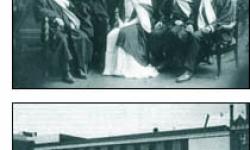Welcome to the Law School. Adelaide, Australia. The University of Adelaide is one of a small group of institutions which pioneered the teaching of law in the English tradition as a university discipline in the nineteenth century. When legal studies began on the North Terrace campus in April 1883 there was only one other fully fledged Law School in Australia. This was at the University of Melbourne where law teaching began in the 1850's. Melbourne's Faculty of Law, however, was not established until 1873.
A Bachelor of Laws degree was instituted. Non-degree students were also permitted to undertake legal studies as a requirement for admission to the local bar. One full-time teacher was appointed to take charge of legal education. With this, Adelaide became the second fully operational Law School in Australia; after Melbourne. Within 12 months, the University's Chancellor and Chief Justice of the Supreme Court, Samuel Way, commented on its progress to William Hearn, the Dean of the Faculty of Law at the University of Melbourne. As he wrote: "Our new Law School is going on very well."
In many ways, it was a bold, innovative decision to establish a Law School at the University of Adelaide in 1883. The earliest classes were given in the rooms of university staff members in the Mitchell building. The School stayed there for more than 75 years. In time, a small suite of rooms on the first floor, including a lecture room, professor's study and a high ceilinged library provided the centre for legal studies for generations of law students. A poorly lighted stairway overshadowed by a stained glass window was the chief method of access.
The departure of the Law School from the Mitchell building was more than a move to a new physical location. It marked the passing of 75 years in which the total number of students seldom exceeded 100. "Large" classes of 30 or 40 were replaced by groups of 100 in the 60's and almost 200 in the 70's as the student population climbed. In 1949 the full-time teaching complement consisted of one person, Arthur Lang Campbell. By 1960 there were eight full-time teachers on the staff. Today there are 38 members of staff.
While teaching has been the main activity of the Law School legal scholarship has also been nurtured. Members of the full-time staff of the School, part-time teachers and graduates have contributed to this through the years. John Salmond, for example, who was professor from 1897-1905, and his immediate successors, Jethro Brown and Coleman Phillipson, were scholars of international repute. A special collection of books and other publications in the Law Library evidences the considerable body of wide ranging contributions made to legal writing by full-time members of the staff.
Today, Adelaide is one of Austrlia's premier Law Schools. The aspirations which Way and others espoused for legal education in South Australia have now been emulated and developed in these and other places. In retrospect, however, without the strength of purpose and dedication of the nineteenth century pioneers who sought to develop legal education within Universities in Australia and elsewhere it is difficult to believe that Adelaide and other Law Schools would have found the measure of acceptance they have achieved in the second half of the twentieth century. Without the active collaboration of the practising legal profession and university educators, over a period of many years, some Law Schools, including Adelaide, could not have survived, at least in terms of providing an unbroken record of service to legal education for a century or more.
By the same token, the establishment and growth of university based legal education began with an acknowledgment that there were essential differences between this and the system of legal training which preceded it. As Way himself indicated in the discussions on the proposal to found the Adelaide Law School, Universities aimed to help provide the broader educational experiences which he and others considered were necessary to provide an adequate training in the law. Down the years, some of Australia's most noted law graduates have echoed these sentiments, emphasising in the process how adequate education in the law requires more than simply the development of technical expertise.
" The history of Adelaide Law School suggests that in its teaching and research and in the ongoing activities of its former students it has striven towards such goals.



Law School reviews
Login to comment